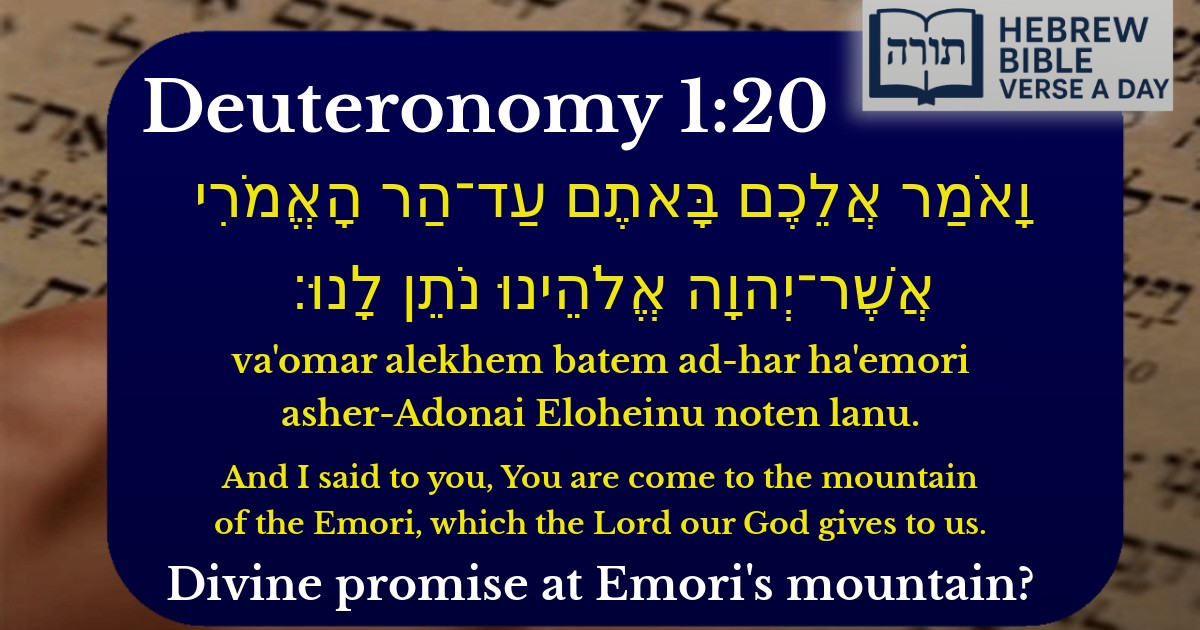Frequently Asked Questions
Q: What does 'the mountain of the Emori' refer to in Deuteronomy 1:20?
A: In Deuteronomy 1:20, 'the mountain of the Emori' refers to the land of Canaan, which was inhabited by the Emorites (Amorites) at that time. According to Rashi, this phrase signifies the beginning of the Israelites' entry into the Promised Land, which Hashem had promised to give to them.
Q: Why is this verse important in the Torah?
A: This verse is important because it marks a key moment in the Israelites' journey—approaching the land Hashem promised to give them. The Ramban explains that it emphasizes divine promise and the fulfillment of Hashem's covenant with Avraham, Yitzchak, and Yaakov, reinforcing trust in Hashem's word.
Q: What lesson can we learn from Deuteronomy 1:20 today?
A: The verse teaches us about faith in Hashem's promises, even when challenges seem overwhelming. The Talmud (Sotah 34b) discusses how the spies later doubted this promise, leading to consequences. We learn that trusting in Hashem's plan is essential, especially when facing new opportunities or challenges.
Q: How does this verse connect to the broader narrative in Deuteronomy?
A: This verse is part of Moshe's speech recounting the Israelites' journey and their failures (like the sin of the spies). The Midrash (Devarim Rabbah) explains that Moshe reminds them of Hashem's faithfulness to contrast their past mistakes, encouraging them to embrace their destiny as they prepare to enter Eretz Yisrael.
Q: Why does the verse say 'which Hashem our God gives to us' instead of 'gave'?
A: Rashi explains that the present tense ('gives') emphasizes that the land is a continuous gift from Hashem, requiring the Israelites' ongoing faithfulness. The Rambam (Hilchot Melachim) later teaches that dwelling in Eretz Yisrael is a mitzvah tied to serving Hashem, showing that the gift is active and conditional on our actions.


Context in Sefer Devarim
The verse (Devarim 1:20) appears in Moshe Rabbeinu's recounting of the journey toward Eretz Yisrael, specifically referencing the approach to Har HaEmori. This moment marks a pivotal point in Bnei Yisrael's journey, as they stood at the threshold of entering the land promised by Hashem.
Rashi's Explanation
Rashi (Devarim 1:20) emphasizes that Moshe was reminding the people of Hashem's promise to give them the land. The phrase "ה' אלקינו נתן לנו" ("Hashem our God gives to us") is in the present tense, indicating that the gift was assured and imminent—if only they would trust in Hashem's word. Rashi notes that this was a test of their faith, as they needed to proceed with bitachon (trust) despite the challenges ahead.
Rambam on Divine Promise
Rambam (Hilchot Melachim 5:1) discusses the mitzvah of conquering Eretz Yisrael, rooted in verses like this one. He explains that the land was given to Bnei Yisrael as an eternal inheritance, contingent upon their adherence to Torah and mitzvot. The present tense ("נותן") underscores that the gift is continuous, requiring ongoing merit.
Midrashic Insights
Ibn Ezra's Linguistic Note
Ibn Ezra observes that the term "באתם" ("you are come") is phrased in the plural, addressing the entire nation collectively. This reinforces the idea that the promise and responsibility of Eretz Yisrael belong to Klal Yisrael as a unified entity, not to individuals alone.
Halachic Implications
The Chatam Sofer (Torat Moshe, Devarim) derives from this verse that settling Eretz Yisrael is a mitzvah incumbent on every generation. Just as Moshe urged the people to recognize the land as their inheritance, so too must Jews in all eras affirm their connection to it as a divine gift.